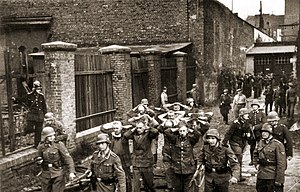Defense of the Polish Post Office in Danzig
| Defence of the Polish Post Office in Danzig (today Gdańsk) | |||||||
|---|---|---|---|---|---|---|---|
| Part of the Invasion of Poland | |||||||
 Captured postmen being led away under the SS escort, with members of the SA and Danzig police looking on. |
|||||||
|
|||||||
| Belligerents | |||||||
|
|
|
||||||
| Commanders and leaders | |||||||
|
|
|
||||||
| Strength | |||||||
| 55 postmen, army officers and civilian volunteers 1 railwayman |
More than 200 SS and SA soldiers, policemen, paramilitaries and regulars 3+ ADGZ armored cars |
||||||
| Casualties and losses | |||||||
| 6 killed (2 killed after surrendering) 14 wounded, 4 died of their wounds, 38 captured and executed |
10 killed 25 wounded 1 ADGZ destroyed |
||||||
The Defence of the Polish Post Office in Danzig (Gdańsk) was one of the first acts of World War II in Europe, as part of the Invasion of Poland.
On September 1, 1939, Polish personnel defended the building for some 15 hours against assaults by the SS Heimwehr Danzig (SS Danzig Home Defense), local SA formations and special units of Danzig police. All but four of the defenders, who were able to escape from the building during the surrender, were sentenced to death by a German court martial as illegal combatants on October 5, 1939 and executed.
The Polish Post Office (Poczta Polska) in the Free City of Danzig was created in 1920 under the Treaty of Versailles, and its buildings were considered extraterritorial Polish property. The Polish Post Office in Danzig comprised several buildings.
As tensions between Poland and Germany grew, in April 1939 the Polish High Command detached combat engineer and Army Reserve Sublieutenant (or 2LT) Konrad Guderski to the Baltic Sea coast. With Alfons Flisykowski and others, he helped organise the official and volunteer security staff at the Polish Post Office in Danzig, and prepared them for possible hostilities. In addition to training the staff, he prepared the defences in and around the building: nearby trees were removed and the entrance was fortified. In mid-August, ten additional employees were sent to the post office from Polish Post offices in Gdynia and Bydgoszcz (mostly reserve non-commissioned officers).
...
Wikipedia
